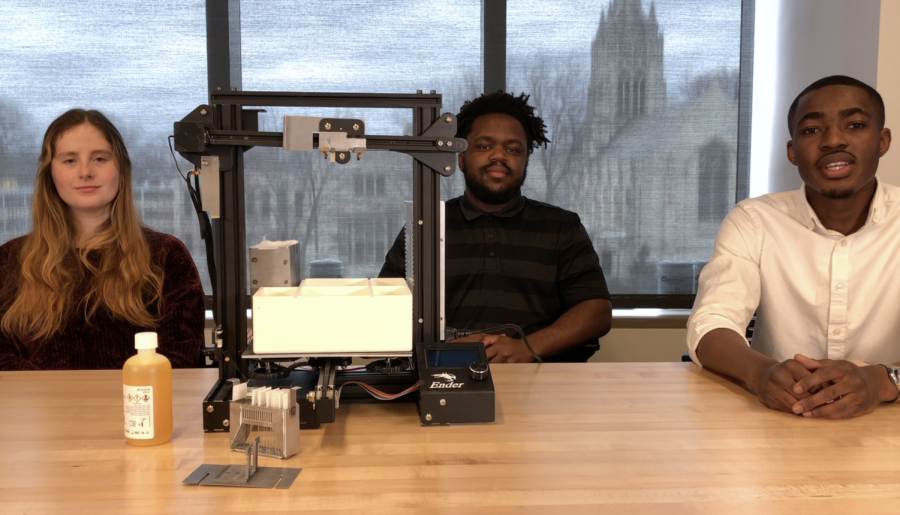From classroom to clinic: McCormick students’ invention aims to improve tuberculosis testing efficiency in developing countries
Photo courtesy of Peter Koussai
Shani Katz, Isaac Tenga and Peter Kouassi present their project, POCAS: TB, which aims to make tuberculosis testing faster, easier and safer.
October 26, 2022
What started off as three McCormick students’ biomedical engineering capstone project has become a potentially life-saving intervention for communities struggling with tuberculosis.
First-year biomedical engineering graduate student Peter Kouassi (McCormick ’22), Isaac Tenga (McCormick ’22) and Shani Katz (McCormick ’22) have developed a new system to address the lack of rapid, safe and cost-effective tuberculosis testing methods in developing countries.
POCAS: TB, the name of the project, stands for Point-of-Care Automated Stainer for Tuberculosis Diagnostics. Constructed using mostly 3D-printed materials, it cost less than $400 to create. Employing a method called sputum smear microscopy, the system can test up to 50 samples of phlegm for TB bacteria in two hours. In comparison, Kouassi said, a technician manually conducting this “tedious” method can only test about four or five samples per hour.
“This is the major kink with TB diagnostics in high-burden and low-resource areas,” Kouassi said.
By automating the staining process, POCAS: TB enables clinics to provide more immediate results to patients.
Currently, patients must go back and forth to the hospital for results, often using public transportation, where the disease easily spreads.
“If we can triage those patients the same day instead of waiting one week or two weeks, the impact is just not even calculable,” Feinberg and McCormick Prof. Mamoudou Maiga, who worked with the team, said.
While several TB identification methods already exist, their complexity, time requirement and high price tag make them ill-suited for environments where TB is a significant issue.
And where TB is a problem is mainly in developing countries, where affording the identification is more difficult.
“There are automated stainers out there. But they’re really tailored to high throughput, high-performance research facilities like in the U.S. and in Europe,” Tenga said.
Tenga said those wouldn’t be a good fit for countries like Mali, where the group is currently furthering its research on the project. There, the stainers might not function because of weak electricity voltage levels or contaminated water.
The disconnect between the producers of biomedical technology and the communities that actually need them is a major roadblock to improving global health, Katz said.
“It costs money to go and test these products on the ground in these lower-income settings where they’re needed,” she said. “Also, there are fewer people there that are able to advocate for it. (It’s) a combination of the two that’s resulting in a lot of these sorts of projects not getting the headway that they should.”
To ensure that the tool they built actually worked for the communities they were trying to help, Koussai said, the group had to test it out in its intended environment.
In July, Koussai and Maiga traveled to the National School of Engineering in Bamako, Mali, where they worked with biomedical engineering student Mohamed Diallo to conduct a clinical feasibility study.
“There are not many technicians in Mali,” Diallo said. “POCAS: TB is important because we can use it in the countryside … and it’s not necessary for people to (come) to Bamako (to get tested).”
Diallo said he will come to Northwestern in the coming months to help develop a new and improved prototype of POCAS: TB.
POCAS: TB recently won a National Institutes of Health-sponsored award in the Design by Biomedical Undergraduate Teams Challenge. The group is now working to raise enough money to bring POCAS: TB to commercialization.
“We want this to be our legacy — something that really will be used in the developing world, even in rural areas.” Maiga said.
Email: [email protected]
Twitter: @ava_mandoli
Related Stories:
— Northwestern announces new economics center, global primary care center
— Ryan family gift to establish new fund for life sciences research
— Buffett Institute unveils Northwestern Global Strategic Plan at February Faculty Senate meeting


